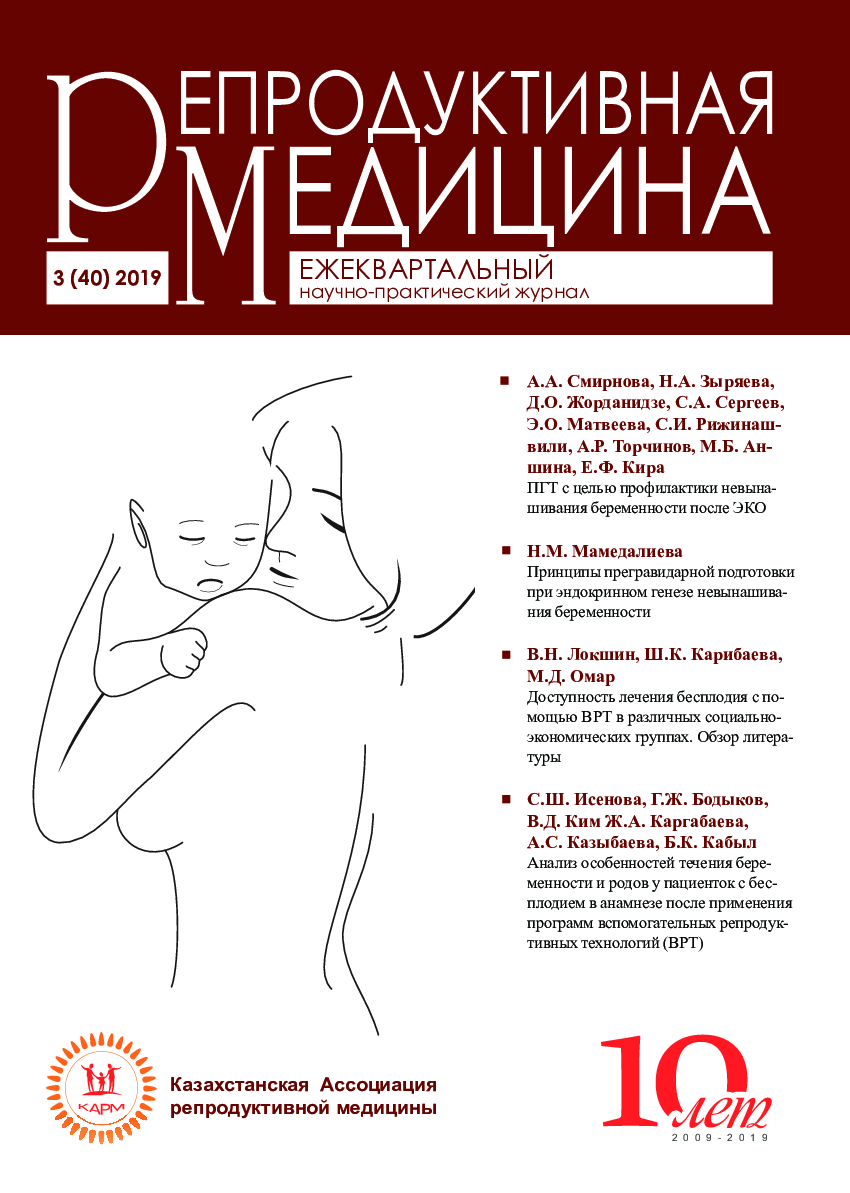Preimplantation genetic testing for early pregnancy loss prevention in IVF patients
Keywords:
spontaneous abortion, infertility, preimplantation genetic testing, in vitro fertilization, aneuploidyAbstract
Background: Advanced maternal age is a reliable risk factor of failed IVF and pregnancy loss. It’s considered that chromosomal anomalies are the main cause of such outcomes. Embryo testing for chromosomal aberrations as a part of assisted reproductive technologies gives us good opportunities, including IVF results improvement and pregnancy loss prevention.
The aim of our study was to assess the usefulness of preimplantation genetic testing (PGT) for increasing pregnancy rate
and prevention of miscarriages after IVF in different age groups of patients.
Material and methods: A retrospective study of IVF results with and without PGT was performed in 70 patients aged under 39 years with
infertility and miscarriages (group 1) and in 284 patients over 39 years (group 2). Trophectoderm biopsy was performed at all
good quality blastocysts, the samples were tested by microarray-based comparative genomic hybridization (aCGH) or nextgeneration sequencing (NGS).
Results
In group 1 aneuploidy rate was 45%. The pregnancy rate per embryo transfer was similar after IVF/PGT and conventional
IVF (64% vs 62%), the pregnancy loss rate was lower after IVF/PGT (7% vs 15%, р˂0,05). In group 2 aneuploidy rate was 68%. The pregnancy rate per embryo transfer was higher (56% vs 30%, р˂0,05) and the pregnancy loss rate was lower (9% vs 30%, р˂0,05) after IVF/PGT in compare with conventional IVF.
Conclusion
PGT may be recommended to patients of advanced maternal age for successful achiving and carrying the pregnancy as well
as to young women with previous pregnancy loss.
References
Van den Berg M.M., van Maarle M.C., van Wely M., Goddijn M. Biochim Biophys Acta. 2012 Dec;1822(12):1951-9. doi: 10.1016/j.bbadis.2012.07.001. Epub 2012 Jul 13.
Tur-Torres M.H., Garrido-Gimenez C., Alijotas-Reig J. Best Pract Res Clin Obstet Gynaecol. 2017 Jul;42:11-25. doi: 10.1016/j.bpobgyn.2017.03.007. Epub 2017 Mar 27.
Wu T., Yin B., Zhu Y., Li G., Ye L., Chen C., Zeng Y., Liang D. Mol Cytogenet. 2016 Oct 12;9:79. doi: 10.1186/s13039-016-0284-2. eCollection 2016.
Recurrent pregnancy loss. Guideline of the European Society of Human Reproduction and Embryology; November 2017; ESHRE Early Pregnancy Guidline Development Group, 153 p.
Kolte A.M., Bernardi L.A., Christiansen O.B., Quenby S., Farquharson R.G., Goddijn M., Stephenson M.D.; ESHRE Special Interest Group, Early Pregnancy. Hum Reprod. 2015 Mar; 30(3):495-8. doi:10.1093/humrep/deu299.
Nybo Andersen A.M., Wohlfahrt J., Christens P., Olsen J., Melbye M. BMJ. 2000 Jun 24;320(7251):1708-12.
Marquard K., Westphal L.M., Milki A.A., Lathi R.B. Fertil Steril. 2010 Sep;94(4):1473-7. doi: 10.1016/j.fertnstert.2009.06.041. Epub 2009 Jul 30.
Корсак В.С., Смирнова А.А., Шурыгина О.В. Проблемы репродукции. 2018; 24(6):8-21. [Korsak V.S., Smirnova A.A., Shurygina O.V. Problemy reprodukcii 2018; 24(6):8-21]. https://doi.org/10.17116/repro2018240618
Hu L., Du J., Lv H., et al. Reprod Biol Endocrinol. 2018;16(1):74. doi:10.1186/s12958-018-0390-6.
Kort J.D., McCoy R.C., Demko Z., Lathi R.B. J Assist Reprod Genet. 2018 Mar;35(3):403-408. doi: 10.1007/s10815-017-1060-x.
Additional Files
Published
How to Cite
Issue
Section
License
The articles published in this Journal are licensed under the CC BY-NC-ND 4.0 (Creative Commons Attribution – Non-Commercial – No Derivatives 4.0 International) license, which provides for their non-commercial use only. Under this license, users have the right to copy and distribute the material in copyright but are not permitted to modify or use it for commercial purposes. Full details on the licensing are available at https://creativecommons.org/licenses/by-nc-nd/4.0/.




